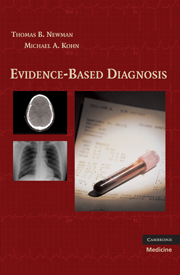Book contents
- Frontmatter
- Contents
- Preface
- Acknowledgments & Dedication
- Abbreviations/Acronyms
- 1 Introduction: understanding diagnosis and diagnostic testing
- 2 Reliability and measurement error
- 3 Dichotomous tests
- 4 Multilevel and continuous tests
- 5 Critical appraisal of studies of diagnostic tests
- 6 Screening tests
- 7 Prognostic tests and studies
- 8 Multiple tests and multivariable decision rules
- 9 Quantifying treatment effects using randomized trials
- 10 Alternatives to randomized trials for estimating treatment effects
- 11 Understanding P-values and confidence intervals
- 12 Challenges for evidence-based diagnosis
- Answers to problems
- Index
Answers to problems
Published online by Cambridge University Press: 04 August 2010
- Frontmatter
- Contents
- Preface
- Acknowledgments & Dedication
- Abbreviations/Acronyms
- 1 Introduction: understanding diagnosis and diagnostic testing
- 2 Reliability and measurement error
- 3 Dichotomous tests
- 4 Multilevel and continuous tests
- 5 Critical appraisal of studies of diagnostic tests
- 6 Screening tests
- 7 Prognostic tests and studies
- 8 Multiple tests and multivariable decision rules
- 9 Quantifying treatment effects using randomized trials
- 10 Alternatives to randomized trials for estimating treatment effects
- 11 Understanding P-values and confidence intervals
- 12 Challenges for evidence-based diagnosis
- Answers to problems
- Index
Summary
Chapter 1 Problem answers: understanding diagnosis
A diagnosis of rotavirus would not often affect treatment decisions, as treatment will generally just be hydration. It might affect decisions about other tests to determine the cause of the diarrhea, although we suspect this is an uncommon justification because when people send stool samples to try to identify an organism it is typically all at once, before the result of the rotavirus test would be available. It might affect decisions about isolation, except that we think one should assume that all childhood diarrhea is quite infectious. The main use would be in tracking an epidemic – for example, of diarrhea on an inpatient ward – or for estimating the impact of a vaccine. Sporadic testing by individual clinicians is unlikely to be very helpful for the latter purpose.
Although this infant does not meet the strict definition of colic used in the randomized trials, he has an entity we might call “crying distressing enough to try a formula change.” In this case, the treatment is benign, and the symptom is highly distressing. There is no biological reason to think that benefits of a formula change will exceed the risks and costs only if the crying is at least 3 hours a day, three times a week.
Whether metastatic undifferentiated carcinoma is a sufficient diagnosis depends on what decisions are to be made and how difficult it will be to make a more specific diagnosis. Although we suspect the prognosis is grim no matter what the primary is, it is possible that there are some diagnoses for which he would choose chemotherapy. On the other hand, we did not tell you much about the patient – some 86-year-olds are much better candidates for chemotherapy than others, either because of underlying comorbidities or patient preferences. […]
- Type
- Chapter
- Information
- Evidence-Based Diagnosis , pp. 255 - 286Publisher: Cambridge University PressPrint publication year: 2009



